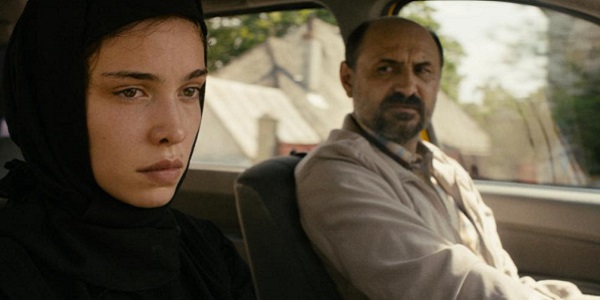Writer-director Bogdan George Apetri’s latest feature, Miracle, is a thought-provoking exploration of morality and mortality divided neatly into two parts: the first chronicling the lead-up to a devastating crime, the second the investigation that follows. It’s an intriguing storytelling approach with mixed results, one that frustrates and fascinates in equal measure.
Body and Soul
The film opens with a young novice, Cristina Tofan (the appropriately ethereal Ioana Bugarin) preparing to sneak out of the rural Romanian monastery where she lives. An ally among the nuns lends Cristina a cell phone and arranges for her to hitch a ride with the nun’s brother, a cab driver who looks on his sister’s vocation with great disdain. The church has too much influence and receives too much money, he declares. As he argues about this with another passenger — a doctor who is headed to the same hospital that Cristina is — Cristina remains silent, her face beautiful but largely impassive. She is preoccupied with far more pertinent, personal issues.

Why is Cristina going to the hospital? She tells the driver and the doctor that it is for a sudden onslaught of bad headaches, but it’s easy for us to see that she is not telling the truth. Nonetheless, many other details remain vague, as Apetri slowly and methodically dribbles out information to the audience while still holding a great deal back. This incredible slow burn, emphasized by the film’s reliance on long, static takes, is powerfully effective at building an almost suffocating amount of tension. Even if we do not know all of the circumstances surrounding the situation Cristina is in, it’s clear that there is something hovering on the horizon that is casting a dark shadow on her future.
Cristina leaves the hospital and, after a couple of additional stops, hails another cab driver for a ride back to the monastery. What starts as a pleasant, friendly journey devolves into an act of sickening sexual violence, one rendered all the more deeply disturbing by what Apetri chooses to let us see and hear and what he does not. The scene is shot in the woods, at a distance through the trees, with the camera revolving slowly to capture the entire landscape; the beautiful fields, trees, and herds of sheep are a stark contrast to the ugly brutality taking place in the shadows just a few feet away. Cristina’s screams are our only real hint as to what is happening, but they are more than enough to convey the devastation. Tofan is brilliant; she does not say a lot in her scenes, but every word and glance is rich with a gravitas that belies her age.
Church and State
Unfortunately, Tofan has minimal screen time in the second half of Miracle, which is the main reason why it did not have the same emotional resonance with me that the first did. Here, we follow a police inspector, Marius Preda (Emanuel Parvu), who is determined to solve the case of what happened to Cristina and punish the culprit at any cost. Marius does not believe in God or religion; his version of morality decrees that anything he does to put this man behind bars is worth it — even if it means he must twist the truth and commit a few crimes himself along the way.
Marius’ reason for being so personally invested in the case is eventually made, if not exactly clear, at least slightly less opaque. However, that doesn’t make watching him plant evidence and coerce witnesses any more sympathetic. Rather, the audience is left feeling unsettled, saddled with the lingering question of whether justice has been truly served if additional injustices were committed along the way. These are important issues worth contemplating, but Parvu’s abrasive performance makes it hard for one to see past his obnoxious surface behavior to the underlying societal issues he represents. One is left longing for Cristina’s melancholy silence, and wanting to know what her perspective on it all is.
Similar to the cab driver who helped Cristina get to the hospital at the beginning of the film, Marius has his reasons for his distrust of religion. When he tries to question the nuns at the monastery, they refuse to share any information with him that might solve the case, worried that being connected with such a crime would affect their standing in the community and as a tourist attraction. As Marius departs the monastery with his rage barely restrained, one cannot help but wonder: In a world where such a horrible event can happen to one of their own, only for them to abandon her in her time of need, how can one maintain one’s faith in God, let alone the church? The film’s climactic twist provides some form of an answer while also raising additional questions.
Conclusion
Nothing about Miracle is clear-cut or easy to comprehend, but it is compelling.
What do you think? What are some of your favorite films out of Romania? Share your thoughts in the comments below.
Miracle opens in theaters in the U.S. on June 3, 2022. You can find more international release dates here.
Watch Miracle
Does content like this matter to you?
Become a Member and support film journalism. Unlock access to all of Film Inquiry`s great articles. Join a community of like-minded readers who are passionate about cinema - get access to our private members Network, give back to independent filmmakers, and more.